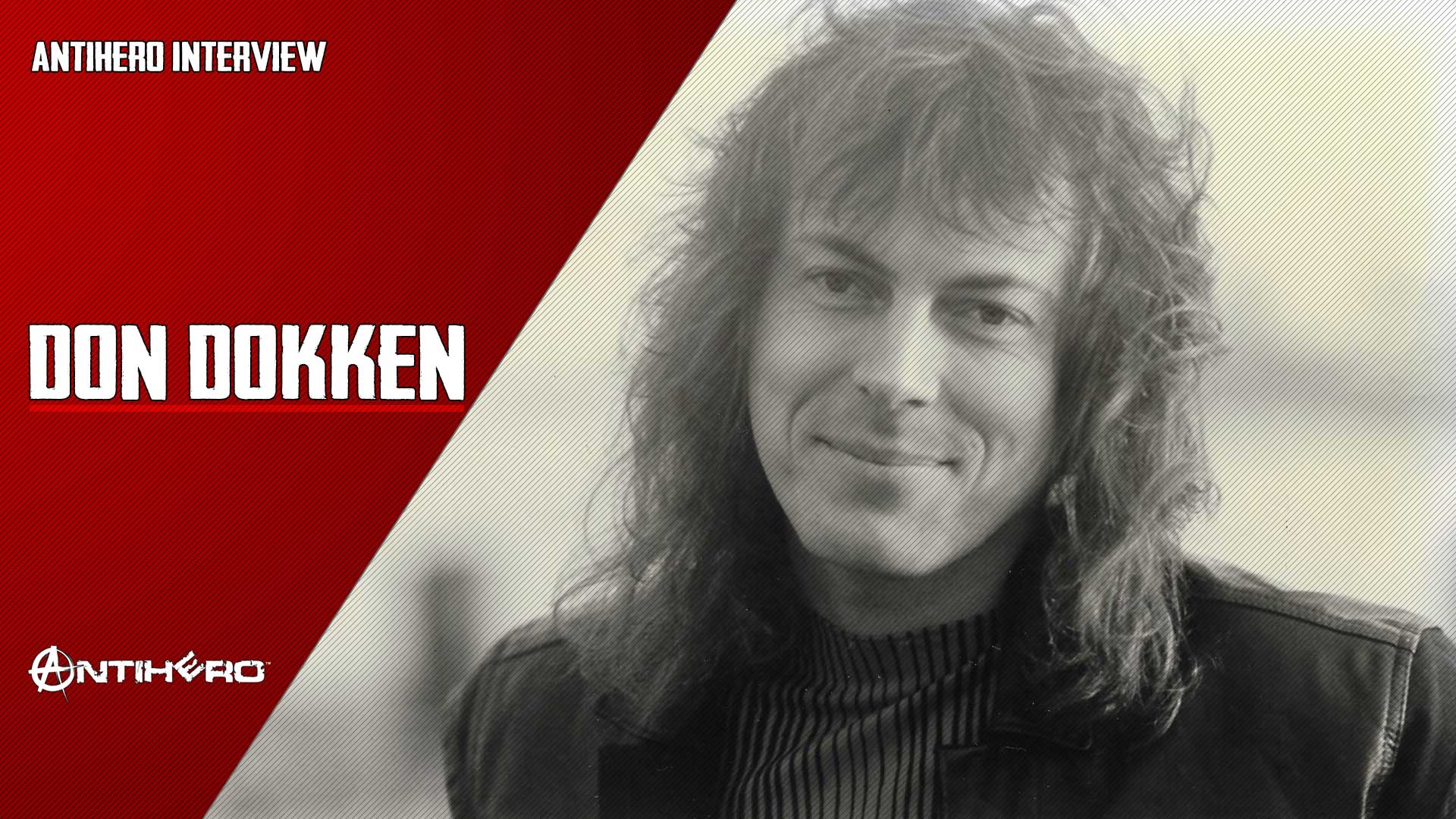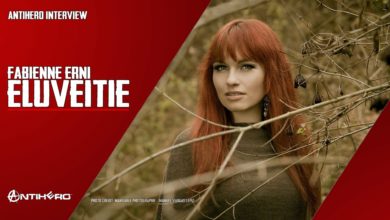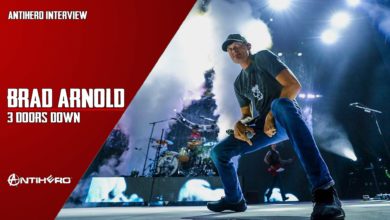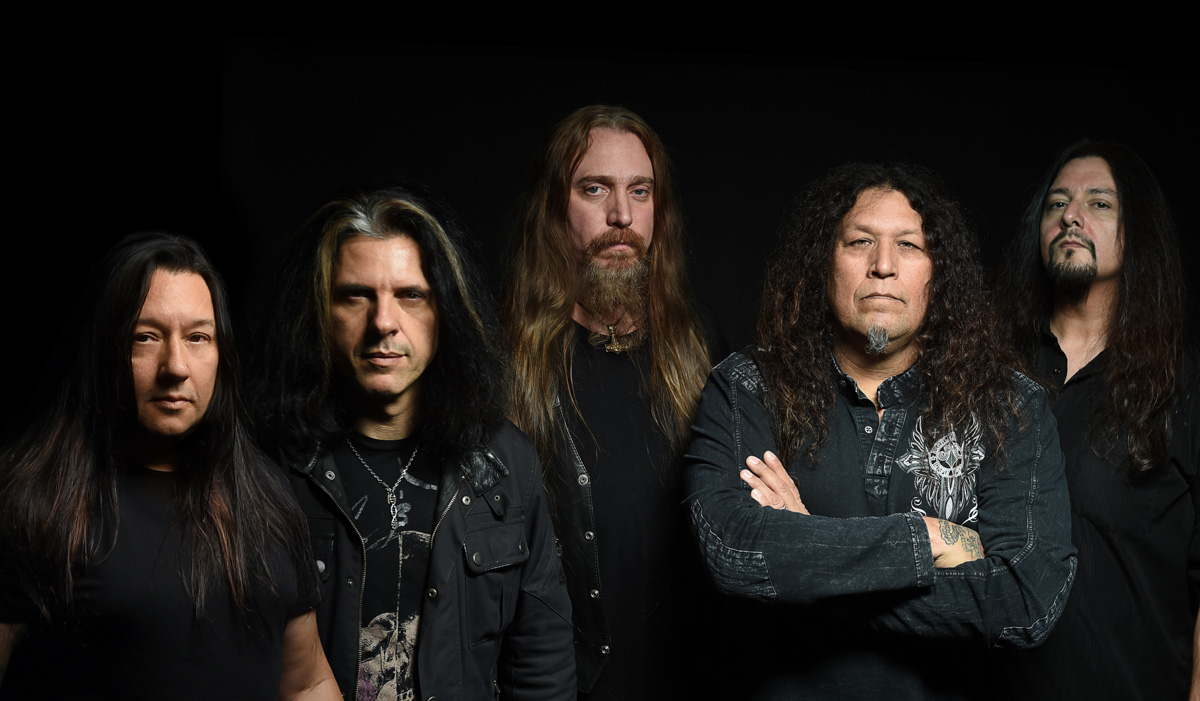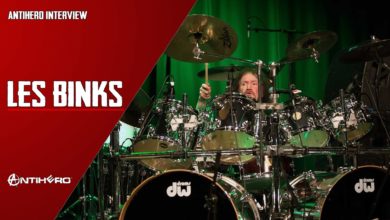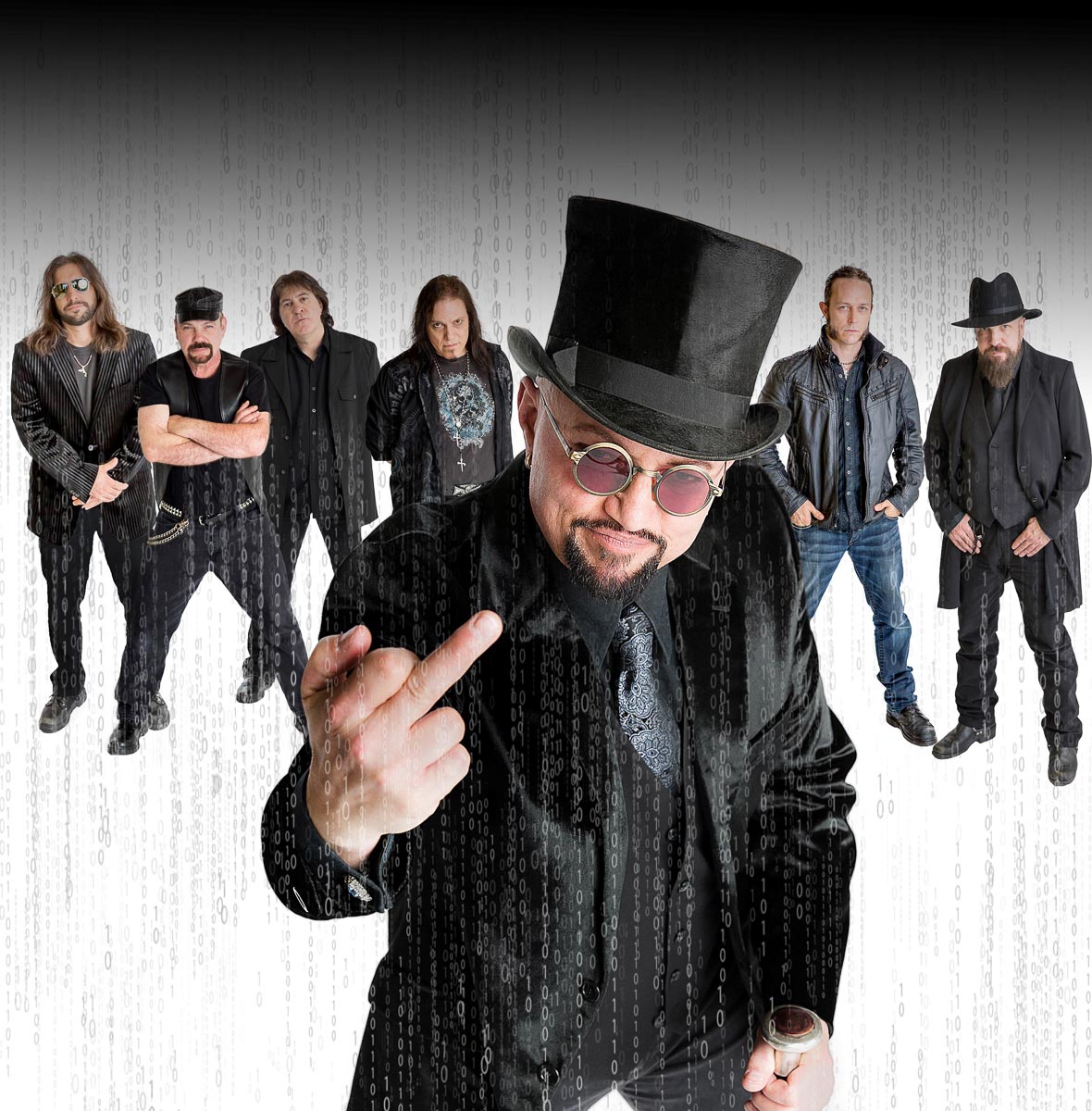“George does shows with us. There’s no more fighting. There’s no more arguing. We’re too old for that”.
I first discovered the music of Dokken like many back in the 80s when their “Under Lock And Key” album was released. Then I saw them for the first and to date last time live when they supported Accept in Belfast. Don has kept the band name burning despite being the sole remaining member of the classic line-up. He has recently dipped into the bands musical archives by releasing an album of “lost songs”-I had the opportunity to have an in depth discussion with him regarding that, the bands musical legacy and also we addressed the subject of those online critics who had criticized his vocals. Breaking the Chains and not avoiding the elephant in the room read on for the full in-depth discussion.
ANTIHERO: Dokken are due to release The Lost Songs next month, which are songs from your own personal archives. I just wondered, what prompted this release?
Don Dokken: Well, many things. I mean, I was cleaning my garage after 15 years. I was cleaning my garage because I was moving some things out to make room for an old car I bought. I bought an old Stingray Corvette and it didn’t fit, so I started packing things and moving it. And lo and behold, I found some old tapes from way back in the day, from the ’70s, that were lost, and I just thought they were lost forever. So I found them in a box and went to a studio and put them up to see what was on them, and here was all these songs that I wrote before Breaking the Chains, before George, Jeff and Mick, when I was in my twenties.
I used to go into studios, and I used to sneak into studios. They’d let me record for free late at night. So, I had all those demos and I decided to finish them. Some were finished, some weren’t. So John Levin put some guitars on them and my drummer redid the drums because some of the songs had a drum machine that sounded terrible. Then because of the COVID thing and we’re not on tour this summer, our whole tour’s cancelled, and honestly, I was bored. So, I figured, “Why not put this out while we’re working on the new studio album?”
ANTIHERO: Were some of the tracks, the live tracks, for example, have they not been previously released?
Don Dokken: Yeah. They were on a bootleg album called Back on the Streets. That was stolen recordings from some son of a bitch in Germany. That came out years ago and he had stolen a lot of my demos. So, nothing I could do. I can’t do anything about it. I live in America. German label, what are you going to do? Take him to court. Sue him. He made a lot of money. The guy made about a million bucks on that album. So, I was talking with my guitar player and he said, “This guy stole your songs and never paid you your publishing or money, but you own those songs. Why don’t you take them and finish up the rest of the songs you found and come up with 11 songs and just put out your own record?” So, I did. That’s how we decided to do it.
ANTIHERO: Did you use all the tracks that you found in the garage, or is this the first of maybe several archive releases?
Don Dokken: No. None of these songs have ever been released because I had them in the garage, except for the ones that are on the bootleg. But there was other songs on the tapes that wouldn’t play. They wouldn’t play. Because now everything’s digital and pro tools and people record albums on digital, but this was on tape, analogue two inch tape. But when you have a tape sit in a box for 35 years, they get sticky and gooey and they literally decompose. And so I played the songs that I could, but there was a couple of other songs that right in the middle of the song, the tape would just start falling apart. So I said, “Well, there’s nothing we can do. We can’t fix it.” So I only found four that were usable. That was The Answer, Step Into The Light. I don’t know. I can’t remember the other two now, but yeah, there was about eight songs. But the ones at the end of the reel, when we got to the end, they literally had mould and they were sticky and they just wouldn’t play. So it’s over with.
ANTIHERO: If I could just pick one of the songs out. If you could tell me a little bit about the origins of the song Day After Day, that one? Why did that never make a Dokken album? Because, it sounds like it would potentially have been a massive hit.
Don Dokken: Yeah, a lot of people told me that. They said, “Wow, this is like Alone Again.” And obviously, yeah, and I wrote that. I wrote that in 1979 when I was in Hamburg, Germany on tour, my first tour in Germany. That’s when I met Michael Wagener and we snuck into his studio and that’s when I recorded Day After Day and a couple of others. I don’t really know. When we did Breaking the Chains, it’s kind of funny, there’s no ballads on Breaking the Chains. None. I should’ve put that on Breaking the Chains.
ANTIHERO: Yeah. It sounds like a great song. It sounds like, as I say, one that would have lent itself to being a massive hit, especially in that era of MTV, the big video production, that song, I feel personally, would have really worked well.
Don Dokken: Yeah. I think if we would have put it out, you’re right, like on Breaking the Chains or Tooth and Nail, that could have been a huge ballad for us. Because, do you remember MTV in the early ’80s? All the bands started putting out videos of ballads, and we didn’t. We only had Alone Again in the second record. But I don’t know, just honestly, because I forgot about the song. It was just that I had forgotten about it seven years later.
ANTIHERO: The only time I ever saw Dokken live, I’m originally from Belfast, so I only ever saw you guys live back in ’86 when you toured with Accept. That was quite an unusual pairing given that Accept were a harder aged heavier metal band. I just wondered how that tour pairing came about.
Don Dokken: Well, it’s an interesting story that I haven’t told many people. The manager of Accept, her name is Gaby Hauke and she was the manager of Accept early on. She actually ended up marrying Wolf Hoffmann, the guitar player. They’ve been married for 35, 40 years now. She was managing Accept, and Accept was in the studio recording Russian Roulette, I think, when I was doing Breaking the Chains at Dieter Dierks’ studios, the Scorpions’ studio. She heard my demo and she took my demo and went to Hamburg and got me my first record deal on Carrere Records.So if it wouldn’t have been for Gaby, we might not be talking right now. Yeah. I give all the credit to Gaby Hauke for getting me my first record contract, my first deal, she got me going. I owe it all to her.
And so you fast-forward. That was 1980, you fast-forward four years and now Dokken’s getting famous. I actually said to Gaby, because we became very good friends, and I said, “I really would like Dokken to break out in Europe because we’re not that popular in Europe.” By then, we were famous in America, very famous in Japan, always sold out. And I said, “We need a tour. I want to go to England and I want to go to Germany, and Italy, and Spain, and France. We need a tour.” And I said, “I know that Accepts much heavier than us, but honestly, I believe that we could hold our own against Accept.” Because we might be commercial rock, but we still have our heavy songs like Kiss of Death, Tooth and Nail, Till the Living End, Don’t Close Your Eyes, The Hunter. We had this kind of schizophrenic band where we had the MTV hits, but anybody that knows Dokken, we had a lot of heavy songs on our records, much more than these other American bands.
So anyway, Gaby put us on that tour and I was very grateful. In Belfast, it was very scary when we did that tour. We stayed in a hotel. I remember it like yesterday, the concert you saw, because the war was going on and they had barb wire and fences and we had this. They searched our bus and the military had machine guns, and they made us all get out of the bus and check all our clothes for bombs and things like this. Because you remember then, there was a lot of bombings in Belfast. I’ll never forget. We played Belfast. I came off the stage, I was walking back to my bus. I saw a lot of police and the fire department and somebody had burned our bus down. They burned our bus to the ground.
And I said, “What the hell?” They burned it down, the whole bus, to the ground. Gone. All of the clothes, all my belongings, my passport, my wallet, my shit, everything gone. I said to the promoter, “I don’t understand why they burned our bus and not Accept’s bus.” And they said, “Because you have English licence plates on your bus.” I said, “English plates? What does that…” See, I’m from America. So I didn’t understand what’s going on in Belfast. And I said, “So because we have England licence plates, who cares?” But they burned our bus down and Accept’s bus had German plates, so they didn’t burn it.
But I mean, Belfast will always be in my mind for walking off the stage and walking outside and seeing a huge 40-foot tour bus burned right down to the tire’s. Gone completely. We lost all our clothes and our passports, and we had to get new passports to get out of the country and buy new clothes and we lost a lot of equipment. So that’s my memory of Belfast, unfortunately,
ANTIHERO: Not a good memory.
Don Dokken: The show was fun. Yeah, come on, Ireland, Scotland. I mean, the fans there are different than Americans. I think Americans are a little spoiled because in Hollywood you could see a band every night. Or you go to Sunset Strip and there was five clubs. You could go down to the Whisky and see Van Halen at nine o’clock. You could walk two blocks to the Troubadour and see Quiet Riot. You could walk to another club, a quarter mile away to the Starwood and see Y&T all playing on the same night. So, that was the Hollywood scene. But in Europe, you don’t have that.
ANTIHERO: No. And in Ireland as well. I remember we didn’t get many rock bands actually coming over in those days either.
Don Dokken: Because it was too expensive. I mean, to go to Ireland, you had to drive the bus and go to Ireland and the hotels and like I said. But during that time you saw us on the Accept tour, there was a lot of problems with… I don’t know who it was, why Ireland was fighting. I don’t know. I don’t know much about Irish politics. It was the Catholics and the Protestants and they were all fighting, the Protestant neighborhoods and your Catholic neighborhoods. I don’t know much about that stuff. So a lot of bands didn’t want to go to Ireland because of all the problems. But we did.
ANTIHERO: Just moving on. Dokken, as a band, have reunited several times over the years and subsequently split up. I just wondered, had it been difficult? Your name is what the band’s about. Has it been difficult to reestablish that particular chemistry that you had with the original band members when they left and other musicians came in?
Don Dokken: Well, I did my solo album, the Don Dokken album in ’91, and that was kind of a supergroup because I had Peter Baltes on bass from Accept. I had John Norum on guitar from Europe. I had Mikkey Dee, who’s now in Scorpions. So I put together a super band and we did really well in America, selling out shows. We did very, very well. People accepted the new band like Dokken. But what hurt us was in late ’91, we were on Geffen Records and Geffen also had Guns N’ Roses and they had Nirvana. And when Nirvana exploded on MTV and Guns N’ Roses exploded, all of a sudden, it seemed like the fans thought like, “Oh, Dokken, that’s ’80s rock. That’s hairband, that’s old-school.” People wanted something new. So we struggled for four or five years. George came back in the band. We did one record with George. Then he left again to do something else. Then I got Reb Beach from Whitesnake for one album, Erase the Slate, and that did okay. So it just seemed like it took a lot of member changes, like you say, to find the magic that I had with George, Jeff and Mick. I finally found that with John Levin. John Levin’s been in my band now for 22 years. Well, and Jeff’s been in Foreigner for 22 years. So when I got John Levin, 22 years he’s been in the band, and my bass player and drummer, I finally felt I’d found the same magic we had in the ’80s with the original line-up.
ANTIHERO: A lot of those ’80s era bands that Dokken grew up with are still touring, still releasing albums. You’ve got L.A. Guns, Ratt. How can you explain the enduring popularity of those ’80s bands where people are still wanting to come out and hear those classic songs in 2020?
Don Dokken: Well, I don’t know the answer. I only have my opinion. I think, as you well know, in the ’90s, the music got very dark. Sounds like Alice in Chains, Nirvana, Monster Magnet. There’s a lot of these bands in the ’90s that were popular though. But the music was much darker. The lyrics about drugs and life sucks. A lot of these bands had very dark lyrics and I just think a new generation came in the year 2000. I meet a lot of fans every show and they say, “I was 12 years old when my parents were listening to Dokken and I never got to see you live. Now I’m 26 and now I’m coming to see you play.” It was like a new generation. The people in the ’80s going to rock concerts, they get married, they have children, they buy a house, they have a job, they stopped going to concerts. Then 15 years later, their children were raised on Dokken, and Ratt, and Van Halen, and Quiet Riot. So these kids, when they’re little, heard their parents playing our music. And now they’re adults, they want to go see us live.
ANTIHERO: The musical climate has changed hugely since you first became involved in music.
Don Dokken: Oh, yeah.
ANTIHERO: With the introduction of the internet, it seems that everyone is a self appointed critic. As an artist, has it made your job more difficult? Do you feel more exposed for all these people? I’m sure you’ve had more than your fair share of online criticism. I just wondered how you deal with it personally. Is it something you ignore, something you take personally?
Don Dokken: No, I don’t. Honestly, I can say honestly, I don’t go on social media. I have a person that we hire to do my social media and our website. But when someone calls me and says, “Oh, somebody posted something on Facebook that they saw you play and Don wasn’t singing good. And the band was terrible. I didn’t like them and they sucked,” everyone’s a critic because in the ’80s there was no social media. Even in the ’90s, there was no social media. But I remember in England you were buying Kerrang! Magazine and Circus Magazine and Rolling Stone, and people got their information from magazines. But now, so I remember my daughter, who’s now 32. She used to watch the internet and see people criticise me and she’d get very upset and she would say back, basically, “Kiss my ass.” But I said, “You have to remember, Jessica, this guy works at Subway sandwiches making sandwiches all day. He has no life. He has no girlfriend. He’s not a journalist. He’s not professional. But he has the power to go on social media and talk shit.” But I said, “Keep in mind, this guy works making tuna sandwiches. I don’t care about the guy making tuna sandwiches saying, ‘I saw Dokken and I didn’t like them.’ I don’t care. I mean, what I care about is when I go on stage and I see thousands of people with their fist in the air, singing the lyrics. That’s what I care about.
So I mean, think about it. Huh? I was just saying, right, we played Wacken last year in Germany. We had like 50,000 people. Well of course, if you have 50,000 people, there’s going to be two or 300 people, they’re going to go on the internet and say, “We didn’t like the band.” I can’t worry about that. I can’t. I’m just making music. I’ve sold millions and millions of records. I’ve made my mark in rock and roll and we’re still going strong. So I really learned the hard way not to get my feelings hurt when someone says, “You’re crap.”
ANTIHERO: Yeah, sure. You’ve had your own widely documented health issues in recent years, I just wondered, has your own personal health regime changed as you have become older? I’m thinking of preserving your voice.
Don Dokken: Yes. It’s been a problem. We get older and our voices are not like they were when I was 27 or eight, or 30, or 35, or 40. When you get older, your voice is not as high as it used to be, so you lose your high notes. And I know every singer in this business, there’s only a few singers that I know that when I see them live, I say, “Holy shit, they sound just as good as they did when they were 30, and now they’re 70.” Klaus Meine. Klaus Meine still sings amazing. He’s got an amazing voice. He still sounds the same. So I guess it’s a God thing. Maybe God just gives people a gift. You see Glenn Hughes go out and do Deep Purple songs. And Glenn Hughes, he’s almost 70. He sings amazing.
Ronnie James Dio to almost the end of his life when he had cancer, he did a concert at Radio City Music Hall and he was fighting cancer, and he still sounded amazing, just like he did forever. So I guess some people are blessed and some people are not. In my world, I have good days and I have bad days and I don’t want to put the blame on anybody. But when you’re flying on an airplane for five hours in a pressurized cabin, and then you go to a hotel and the air conditioning’s on, and it’s 100 degrees outside, and then you go in your room and it’s 60 degrees, then you get back on a plane, your voice goes out.
ANTIHERO: How do you look back on your own musical legacy both in and outside of Dokken? It must fill you with pride when you look back at all those songs, those albums.
Don Dokken: I’m grateful, of course. I mean, when we made Breaking the Chains, I remember thinking, “We’re going to make this record. We’re going to go on tour with Blue Oyster Cult.” We only sold a 100,000 copies originally. And I remember thinking, “Well, that’s it. One record. They’re going to drop us from the label and goodbye.” I remember begging Elektra Records to give us one more chance. I said, “I really want one more chance.” They wanted to get rid of us. And that’s why I called the album Tooth and Nail, because I told the boys, George, Jeff and Mick, “Listen, we better write a really fucking great record or it’s over, it’s finished, and we’re all going to be cooking hamburgers.” So, you have to believe in yourself. But honestly, I never would have believed that we would have sold 10 million records. I just didn’t believe it. So every time we put out a record, I’m like a father having a baby. Every time we make a record and the record’s done and we put it out, I’m always nervous that the fans won’t like it. I’ve always been very paranoid like, “I hope they like the record. I hope they like the record.” I never know. Under Lock and Key, Back for the Attack, even the Live album, Japan, I was always very nervous that the fans wouldn’t like it, but we’ve had good luck.
ANTIHERO: Outside of touring and creating music, what do you do in your spare time? Have you any interests or hobbies, or is music just everything for you?
Don Dokken: No, that’s Jeff Pilson. Jeff Pilson, all he thinks is music. No. Well, I live up on a mountain and we have a lot of trees. I have 13 acres of trees. And so until my back surgery, because now my right arm is paralysed and my right hand is paralysed, so I can’t use my chainsaw anymore. I can’t trim trees. I can’t rake. I can’t work in the garden because my right hand is fucked. But the answer is when I’m off the road, I like to work on the house and work on the trees and cut them and trim them and work in the garden. We have four big dogs. I like to take our dogs hiking, and that’s what I do. And of course, I have a studio at the house, so I work in the studio and I’m just writing songs. But yeah, after my hand got paralysed, this was a real problem because I can’t play guitar anymore. So when you can’t play guitar, I can’t write anymore. I can’t write new songs. So I’m kind of fucked right now.
ANTIHERO: I was going to say, your new release is specifically older material from your musical past. But what lies ahead for you musically? Obviously, fans are going to always want a new Dokken album. Do you have any songs written for a new Dokken album? Is that something that’s likely to happen?
Don Dokken: Yes. We’ve already finished half the record. We got very lucky. Our last record was almost five years ago and that was Broken Bones. When we wrote Broken Bones, we wrote almost 17 songs for that record, when I was still playing guitar before my surgery. Before my surgery, we wrote 17 songs. We picked 11 best. And so when we started writing the new record, we went back to the hard drives and I said, “Let’s see what we wrote back then, if there’s anything good enough.”
And so luckily, we found about five songs that were really good. So I thought, “Wow, we’ve got a whole bunch of…” I remember we were originally going to make Broken Bones a double album. So we didn’t. But now, all of a sudden, we had four or five, six songs that were already written. So that really gave us a jumpstart to finish those songs, write lyrics, arrangements, put the drums on and stuff like that. So we’re already halfway. I’d say we have a half of it. I’d say we have seven songs that I think are good enough for a new studio album. So we need four more, maybe five. That’s what we’re doing now. John’s got great guitar in there. It’s like the new era. We work over the internet. John writes a guitar song. He emails it to me. I say, “Yes, no, no, maybe, no, yes.” He writes songs and he sends them to me and I write lyrics. I go into my photo studio and I sing it, and then we’ve got another song. So that’s what we’re doing now, is writing songs over the internet. Because of the COVID, we can’t get together. So I’d say probably, we’ll have enough songs, I’d say now by September, we’ll have all the songs.
ANTIHERO: Right. Just a couple to finish. Do you still have dreams, hopes and ambitions in your career?
Don Dokken: No. As far as my career goes, no. I’ve accomplished what I wanted to accomplish. I’ve been to the top of the mountain and I played stadiums and I’ve played with AC/DC all over Europe and stadiums. I’ve accomplished what I wanted to accomplish. You say as far as what I want now is what everybody should want and that’s peace and happiness and good health, especially now with my hand. You need health and you need to happiness and to be at peace with yourself.
ANTIHERO: Just a final one. What would be the most important lesson a long career in the music has taught you? What lesson have you taken away from your time in the music business?
Don Dokken: What lesson? Be more patient.
ANTIHERO: That’s great, Don.
Don Dokken: We’re older now. George comes on the road sometimes. I still play with George. George does special guest. We get along. George does shows with us. There’s no more fighting. There’s no more arguing. We’re too old for that.
ANTIHERO: That’s great. Thank you very much. I’m just out of time now, but Don, thank you very much for talking to me.
Don Dokken: Thank you. Enjoy the Manchester weather.

